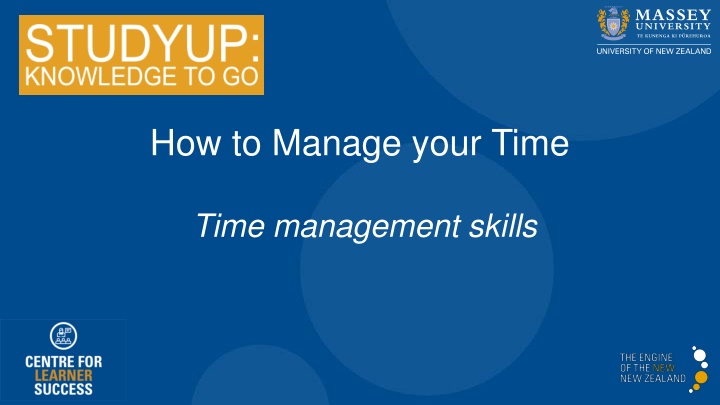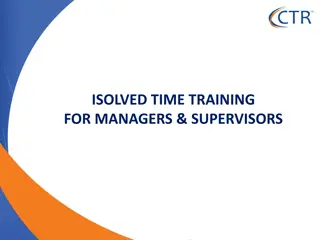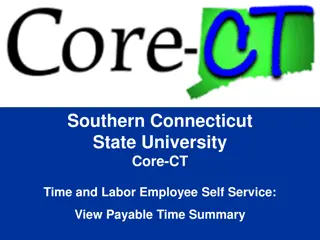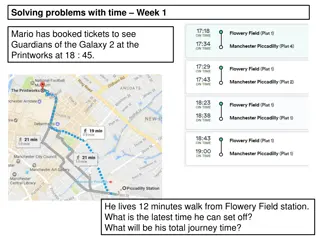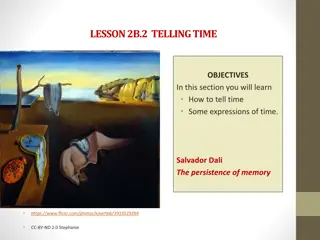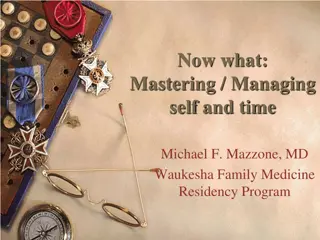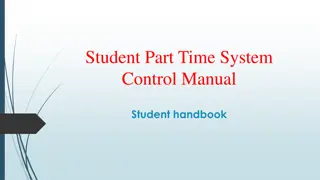How to Manage your Time
Enhance your time management skills with practical steps tailored for university students. Learn how to create a study timetable, prioritize tasks, and allocate study hours effectively. Discover the recommended study time per week, utilize helpful tools, and optimize your study sessions with valuable tips. Take control of your university workload and excel academically!
Uploaded on Mar 07, 2025 | 1 Views
Download Presentation

Please find below an Image/Link to download the presentation.
The content on the website is provided AS IS for your information and personal use only. It may not be sold, licensed, or shared on other websites without obtaining consent from the author.If you encounter any issues during the download, it is possible that the publisher has removed the file from their server.
You are allowed to download the files provided on this website for personal or commercial use, subject to the condition that they are used lawfully. All files are the property of their respective owners.
The content on the website is provided AS IS for your information and personal use only. It may not be sold, licensed, or shared on other websites without obtaining consent from the author.
E N D
Presentation Transcript
STUDYUP: KNOWLEDGE TO GO How to Manage your Time Time management skills
Learning Outcome Apply timetabling and prioritising skills to get started with studying at university level
Five steps to better time management at university 1. Get a wall planner 2. Fill in a timetable 3. Write a to do list 4. Prioritise your tasks 5. Taking back control (when things go wrong)
How much time is needed for study? 12-15 hours per paper/week/semester (average) Think of it as a full time job Workload planning tool : http://www.massey.ac.nz/massey/learning/distance -learning/workload-planning-tool.cfm
Step 1: Get a Wall Planner Write down when your exams are, and when assignments are due
Step 2: Fill in a Timetable
Step 3: Fill in a Timetable Block out your lecture times Block out your tutorials Block out existing commitments: anything you do on a regular basis Block out your study time in the time you have left
Gym Tutorial Lecture Study Study Study Study Study Lecture Gym Lecture Lecture Tutorial Paid work Study Paid work Study Study Tutorial Tutorial Tutorial Study Study Study Study
Is this a good timetable? Study Gym Lecture (115.111) Tutorial Tutorial Study Lecture (115.113) Study Tutorial Study Study Lecture (115.112) Tutorial Study Tutorial Paid work Study Paid work Study Gym Tutorial Gym Study Study Study Study Study
Two Tips Have breaks during your study (study for 50 minutes, 10-minute break) Schedule your study time during your optimal time
Step Three: Write a To Do List Check out stream, your study guide Go to lectures and tutorials Read lecture notes Read and take notes (textbook reading, and/or journal articles) Do online quizzes Do research for your assignment/s The assignment planning calculator is a useful tool.
Time management tool Assignment planning calculator on OWLL http://owll.massey.ac.nz
Assignment planning calculator
The assignment planning calculator Initial planning Researching Writing Reviewing and revising After the assignment
Plan Your Week & Day Day Done Week : 6 10 March 6 Mar (Mon) 175.733 : Read Chapter 3 (Issues in Health Promotion) Note-taking 7 Mar (Tues) 175.720 : Read article on women s rights Write reflection/reaction in journal 8 Mar (Wed) *Attend StudyUp online session: Avoiding plagiarism [12 pm] 9 Mar (Thurs) 175.743 : Read article on introduction to health psychology Write reflection/reaction in journal 10 Mar (Fri) 11/12 Mar (Sat/Sun) *Revise notes for 175.733 (Chapter 3)
Give it a go Plan Your Week & Day Day Week : 6 10 March Done 6 Mar (Mon) 7 Mar (Tues) 8 Mar (Wed) 9 Mar (Thurs) 10 Mar (Fri) 11/12 Mar (Sat/Sun)
Step 4: Prioritise your Tasks How do you know how long something is going to take? How do you decide what to do first?
How long will tasks take? Sometimes you don t: use the time and a half rule Is it a task that I need to do (read a chapter of my textbook)? OR Is there a time limit? Do I only have an hour to do some reading?
Which to do first? Look at your wall planner: when are your assignments due? When are your lectures (what should you read beforehand)? Prioritise tasks with deadlines Sometimes it doesn t matter what you do first
Step 5: Taking back Control Sometimes things go wrong and it s our fault Sometimes life gets in the way
Avoid procrastinating & distractions Break assignments into small, manageable tasks Make checking Facebook/sending texts, etc., a reward Turn off automatic notifications (email, etc.) Remind yourself of the end goals: long- and short-term Follow the DIN approach : Do It Now!
Life getting in the way Is there available time in the evenings or mornings? Are there existing commitments you can put on hold? If you have kids, can someone babysit for you at the weekend? Set your time for study and stick to it: no distractions
Summary 1. Get a wall planner 2. Fill in a timetable 3. Write a to do list 4. Prioritise your tasks 5. Taking back control (when things go wrong)
Need help? We have a range of free services to help you with your assignment writing and study skills Individual Support: Want to discuss your assignment before you hand it in? Want to discuss study skills (e.g. how to manage time)? Book an appointment at massey.ac.nz/ctlcontacts or drop in. Pre-Reading Service: Submit a draft assignment and receive individual written feedback on your assignment s structure, focus, referencing, and use of sources. This service is available to first year internal and all distance students. You can access the forum through the Academic Writing and Learning Support site on your Stream homepage. Workshops: Seminars and workshops are run on campus and online, which can help you with writing and study skills, such as essay writing, referencing, and writing research proposals. See here for programmes and registration details. See http://owll.massey.ac.nz/about- OWLL/workshops.php Academic Q+A forum: Ask our consultants a question about academic writing and/or study skills. The Q & A forum is a place for students to receive help with quick, study-related questions. You can access the forum through the Academic Writing and Learning Support site on your Stream homepage. OWLL: Information about academic writing and study skills, including assignment planning, essays, reports, and referencing. Go to http://owll.massey.ac.nz/index.php Disability Services: A range of services and support for students who have health and disability issues that are impacting their study. Pasifika@Massey: Whether studying as an internal or distance student, you can also access Learning support from the Pasifika Learning Advisors. Te Rau Tauawhi: Ko t Te Rau Tauawhi he whina i ng tauira M ori ki te tuku aromatawatai ki Te Reo M ori, ki te tautoko hoki i ng huatanga whakarite tuhinga. The Te Rau Tauawhi M ori Student Centre can help you to submit your assignment in Te Reo M ori and provide general assignment structure support. learnersuccess@massey.ac.nz
